 Having Trouble Sleeping as you Age Many of us experience changes in our sleeping as we age. We may find it hard getting to and staying asleep, or waking early unrefreshed, making us feel sleepy and sluggish during the day. Research suggests most of the sleep problems among the elderly are because of physical and psychological health problems and the medications used to treat them. Lack of sleep contributes to falls, car accidents, sensitivity to pain and a poor quality of life. The amount of sleep required by each person varies from 7-9 hours. It’s not the time sleeping that matters, it’s how you feel when you wake that’s important. There are a number of stages to sleep, dreamless periods of light sleep and deep active dreaming sleep (REM sleep). This cycle is repeated several times during the night and although total sleep time tends to remain constant, as we age we spend more time in the lighter stages of sleep than in deep sleep, which is more refreshing. This contributes to wakefulness during the night. Generally as we age we go to bed earlier and wake earlier. Here are a few tips to improve your sleep
Still not sleeping If after trying these tips for some weeks you’re still not sleeping well talk to your Doctor as you may:
Happy sleeping from the team at Therapy Professionals Ltd. References:
Lecture by Dr Alex Bartle “Sleep Disorders In the Elderly” https://www.helpguide.org/articles/sleep/how-to-sleep-well-as-you-age.htm?pdf=13837 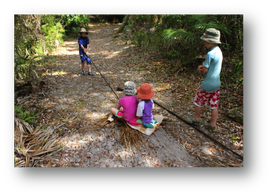 Why free play is good? In today’s western world we have been encouraged to think success in life is all about academic achievement and the only way to achieve this success is through providing our children with ‘academic enrichment’ games and services. These enrichment activities can start well before school age and tend to gain momentum as the child ages. This, the “stranger danger” phenomenon and our busy lifestyles have led to a decline in children and youngsters play time especially unstructured free play. Play is very important in the growth and development of all youngsters. It helps with their physical, emotional, social and intellectual development. In general terms, play come in two categories: unstructured (free play) or structured play. Both forms are important. Structured play is directed by an adult with a goal in mind. It helps children learn to follow rules and routines, and give opportunity for development of physical and social skills. Unstructured free play is not led by an adult and has no goal. It may move from activity to activity, and may involve other children and possibly adults. This type of play allows children to explore and develop the skills needed for negotiating life without feeling pressured or fearful of making mistakes. Most play involves some physical activity, either hand skills or larger body movements. Play allows the child to gain strength, coordination and control over their movements, as well as physical fitness. Free unstructured play helps children learn about society and their emotions, especially through imaginative role play, where they pretend to be an adult. This helps then understand the society they live in and how to relate to others. They gain skills such as turn taking, sharing, negotiating and managing conflict. Youngsters learn from their peers and they enjoy playing together. This is a great learning ground for acquiring communication skills. The better children can express and make themselves understood, the less anxious and frustrated they will be, and the more relaxed they will be about new experiences and challenges. The practice they gain from role playing helps them conquer their fears and develop the confidence to independently deal with new situations. Free play helps youngsters gain a sense of who they are, their likes and dislikes, strengths and abilities, and to respect the differences, thoughts and feelings of others. They build on what they know and explore different experiences in imaginative ways, enhancing their thinking and problem solving skills and their ability to entertain themselves. Why is the lack of free play a problem? Over the past 20 to 30 years, in an attempt to ensure their children’s success, parents have filled their children’s weeks with organised activities so there is little time for creative imaginative free play. This may account for the rise in anxiety, depression and suicide experienced by a growing number of our young adults. Studies have linked feelings of anxiety and depression to perfectionism. Perfectionism often comes from highly critical parents who expect excellence, which may produce overly self-critical children. Some may have learned success must happen at any cost and become anxious to get the perfect marks at the expense of values such as honesty and integrity. This is believed to have contributed to the increase in cheating in our high schools and universities. Perfectionism reduces creativity and is not good for society. If we wish to reverse the trend of depression, anxiety and perfectionism among our youngsters, society and parents need to revisit their ideas on what success looks like, slow our pace of life down and let our children engage in a balance of structured enrichment activities and unstructured free play. http://pediatrics.aappublications.org/content/119/1/182 https://www.pentagonplay.co.uk/news-and-info/why-free-play-is-crucial-for-early-years-children https://www.verywellfamily.com/unstructured-play-2764971 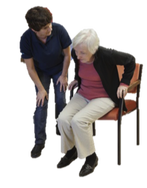 Helping someone to get out of a chair With prompting Get their attention and tell them you want them to get up from the chair. Ask them to:
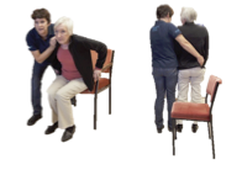 With assistance - If they need more than just a prompt to get up Get their attention and tell them you want them to get up from the chair. Ask them to:
You will:
You can walk holding them in this position, ensuring you keep them close. If they need more support two people can do the move. 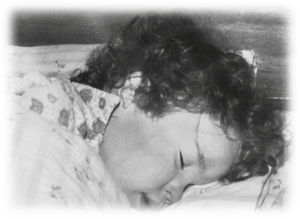 Getting children to sleep Following on from our last post "Why Do Children Need Sleep?" - this post is on helping children to sleep. We know sleep is good for all of us, particularly for restoring energy and helping children grow and develop. The question is how do we ensure children get enough sleep? How do you know your child is getting enough sleep? If your child wakes easily in the morning: happy, cheerful and full of energy, they have had enough sleep. If children are hard to wake, are dozy, inattentive, hyperactive and have regular meltdowns they are probably not getting enough sleep. The good thing is children love predictability and knowing what happens next. It makes them feel safe and secure. This means if your child and family have daily and weekly routines, this helps to establish good sleep patterns. Here are a few suggestions on how to establish good sleep routines with children: Physical activity or exercise - Ensure your child is regularly physically active during the day as exercise helps tire them out. However stop intense physical activity 1-2 hours before bed time as exercise stimulates the brain. Food - only eat small snacks (crackers and fruit) in the two hours before going to bed. Avoid caffeine - caffeine is in a lot of energy and fizzy drinks as well as tea, coffee and chocolate. Caffeine is not recommended for children and teenagers, however if they have caffeine restrict it to early in the day. Screens - Stop screen time at least an hour before bed. Screen lights trick the brain into thinking it’s still daylight stimulating hormones that keep us awake. We recommend TV’s, phones, computers and video games are not in bedrooms over night or better still not in bedrooms at all. Regular bed time and getting up time - first work out how much sleep your child needs, some need a little less than others and some children are larks and others are night owls. This will affect what bed time you set. For a guide see the chart below. Routines can vary a little in the weekends and holidays. Bed time routine - this is very important and should start an hour or so before bed time and may include:
We recommend that your approach during this routine be quieter and calmer than your usual interactions and that the general activity around the house be slowed down if possible. Bed room environment - to encourage sleep the bed room needs to be cool, dark and quiet. A night light may help some children who are afraid of the dark. If you want to block out the noise of the household use a machine like a fan that has a regular monotonous rhythm to it. Afternoon naps - between ages 3-4 children generally stop their afternoon nap. Ensure children older than 4 years have a shorter nap (less than 30 minutes) and not within three hours of bedtime. Stress and anxiety - talking to a child in a quiet calm manner will help keep their stress hormones down and help address any fears. If simple reassurance doesn’t work, you can try having a special toy to stand guard at night or spray the room with “monster spray” before bed. (A can of air freshener with a creative new label works well.) If you have a child who worries about not getting to sleep, don't focus on the sleep, focus on relaxing and having a quiet time. Modelling - Children take their lead from their parents so it’s important to have a good routine for yourself. Sleeping is still a problem - if after trying these strategies for a month or so and your child is still having trouble sleeping see your Doctor. Don't underestimate your children's need for sleep. Here at Therapy Professionals we see some children whose disabilities worsened and others who have been labelled as hyperactive, disobedient, or clumsy when poor sleep has been the significant problem. We all want our children to thrive and one thing we can do for them is establish good sleeping habits. This will help the child and the household. References Healthline Editorial Team (2017) ’10 tips to get your kids to sleep’, Healthline. Ministry of Health (2017) ‘Helping children sleep better’. Macmillan, A, (2015) Sleep tips for kids of all ages’, Webmd.com. Marcu, Shai, The benefits of a goodnight’s sleep – Sleep to remember. Remember to sleep, TED –Ed. Harvard Medical School (Jan 2006), Importance of sleep: six reasons not to scrimp on sleep. American Psychological Association, Why sleep is important. Leech, Joe (June 2017), ‘Ten reasons why good sleep is important’, Healthline. Peterson, SM and Werneburg, BL, Sleep: The foundation for healthy habits, Mayo Clinic  Fitness as we age Keeping fit when older is important and takes more effort the older we get. Fifty per cent of those over 75 are sedentary (sit most of the time) and 25% of those over 85 aren’t active at all. Habitual activity makes up a large part of all activity. Housework makes up more than half of an older woman’s activity. As we get older, fitness is more Important than weight, so relax about your shape and concentrate on fitness. So how fit are you? What walking distances can you comfortably do?
Being unable to walk round the block is one indicator you have an increased risk of falling. Test your fitness with the “Get up and go test”– using a dining chair. Record how long it takes you to stand; walk three metres (10 feet); turn; walk back; sit down again. After a month of exercising, test yourself again. A change more than four seconds can indicate a change in the level of mobility eg six seconds slower indicates slower/less confident mobility or six seconds faster indicates stronger/more confident mobility. Below are some moderate intensity realistic exercise ideas for you to improve your fitness:
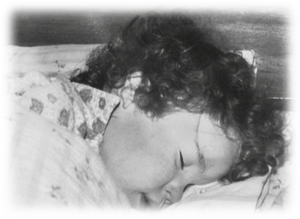 Why sleep is good for children Our brains are always active, even when we are asleep. While sleeping, the brain clears out its waste, sorts and stores information into our memories and regulates many of our body’s functions. Sleep is important for everyone, especially children as they are growing and learning at a great rate. Here are some of the reasons why. Growth and development While a child sleeps growth hormone is released which is responsible for the development of bone and muscle bulk. Children who get less sleep have less growth hormone. Memory and therefore learning While a child sleeps the things they’ve done and learnt during the day get sorted and stored in their long-term memory. If they are sleep-deprived they’ll store 40% less information than those who get enough sleep. Also sleep prepares them for learning, ensuring children can stay awake, concentrate and pay attention. Emotional, Social and Mental Health Studies show when sleep deprived we become 60% more emotionally reactive and are physically slower responding to things; much like being drunk. Lack of sleep may explain why some children are hyperactive, miss social cues, have regular “melt downs”, are anxious or appear clumsy and uncoordinated. This may also account for some childhood accidents. Poor sleep is an issue in most mental health problems - anxiety, depression, post-traumatic stress disorder. Improves our immune system A child’s immune system keeps developing until adulthood. While sleeping they produce cytokines (small proteins), which help them fight infections. After just one poor night’s sleep the activity of cytokines reduces by 75%, making a child more susceptible to infections such as the common cold. Maintaining a healthy body weight Sleep helps regulate the daily fluctuations in the appetite hormones ghrelin (stimulates appetite) and lectin (suppresses appetite). This means children don’t feel the need to eat constantly throughout the day or to store excess calories, so they don’t gain too much weight. If they eat a healthy amount they will sustain their bodies and gain some muscle mass. Those children who don’t get enough sleep are more likely to be overweight, although there are other factors that influence weight gain. The bodies of children who get enough sleep are able to react to insulin levels better. Insulin controls the levels of glucose in the blood. Those who don’t get enough sleep have higher blood sugar levels and are at higher risk of developing type 2 diabetes. How much sleep is enough? Eric J. Olson’s (MD) guidelines recommend the following: Age group. Newborns: 14 to 17 hours a day 12 months: About 10 hours at night, plus 4 hours of naps 2 years: About 11 to 12 hours at night, plus a 1- to 2-hour afternoon nap 3 to 5 years: 10 to 13 hours 6 to 13 years: 9 to 11 hours 14 to 17 years: 8 to 10 hours Adults: 7 to 9 hours Our next post on sleep will give some tips on how to establish good sleeping patterns for your children. |
AuthorShonagh O'Hagan Archives
July 2024
|




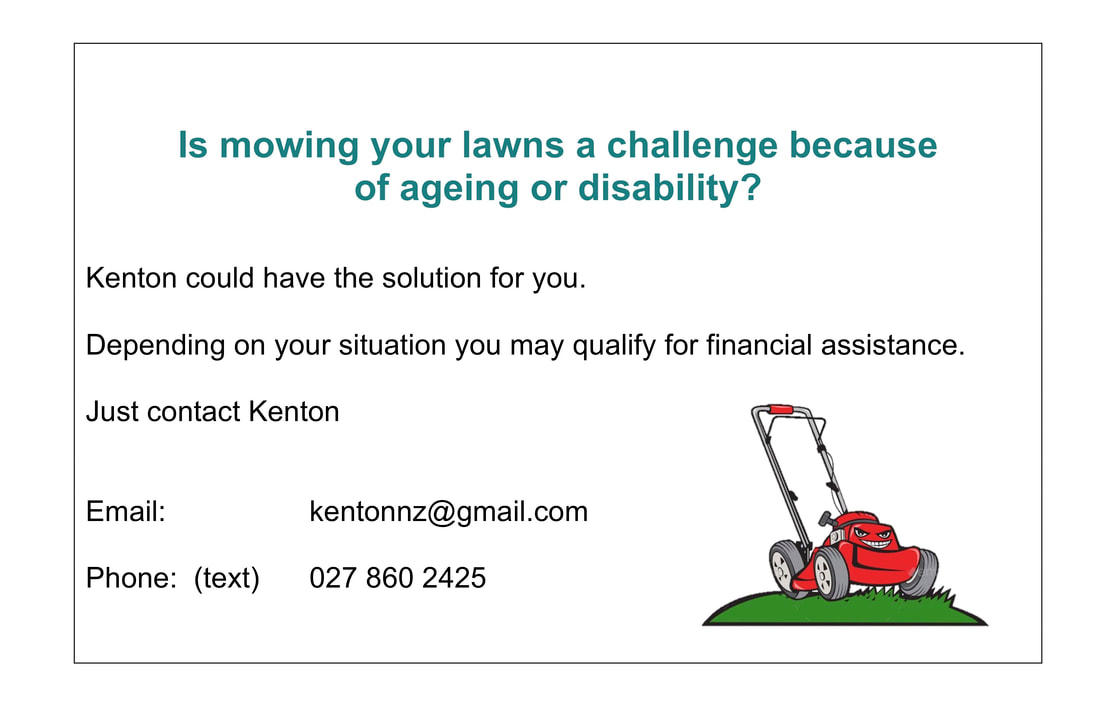
 RSS Feed
RSS Feed